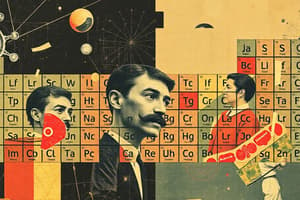Podcast
Questions and Answers
What type of bonding occurs when shared pairs of electrons exist between atoms?
What type of bonding occurs when shared pairs of electrons exist between atoms?
- Hydrogen bonding
- Covalent bonding (correct)
- Metallic bonding
- Ionic bonding
What type of bonds result from unequal sharing of electrons and lead to dipoles within molecules?
What type of bonds result from unequal sharing of electrons and lead to dipoles within molecules?
- Polar covalent bonds (correct)
- Ionic bonds
- Metallic bonds
- Hydrogen bonds
What does stoichiometry help calculate in chemical reactions?
What does stoichiometry help calculate in chemical reactions?
- Temperature changes
- Atomic masses
- Balanced ratios of substances (correct)
- Rate constants
Which concept allows us to determine the limiting reagent and predict reaction yields?
Which concept allows us to determine the limiting reagent and predict reaction yields?
In which field can a deep understanding of basic chemistry provide valuable insights according to the text?
In which field can a deep understanding of basic chemistry provide valuable insights according to the text?
What does understanding atoms, molecules, and reactions allow individuals to do, according to the text?
What does understanding atoms, molecules, and reactions allow individuals to do, according to the text?
What particles are found in the nucleus of an atom?
What particles are found in the nucleus of an atom?
What is the charge of a proton?
What is the charge of a proton?
What are electron shells or electron clouds?
What are electron shells or electron clouds?
What type of bond is formed when electrons are shared between two atoms?
What type of bond is formed when electrons are shared between two atoms?
How are elements arranged in the periodic table?
How are elements arranged in the periodic table?
Why is the periodic table useful for scientists and students?
Why is the periodic table useful for scientists and students?
Flashcards are hidden until you start studying
Study Notes
Exploring Basic Chemistry
Chemistry is a captivating subject built upon understanding the fundamental interactions between matter's constituents—atoms and molecules. In this exploration of basic chemistry, we will delve into its core concepts to grasp why our world functions with such intricate balance and beauty.
Atomic Structure and Elements
Atoms, which make up all matter, consist of protons, neutrons, and electrons arranged in specific patterns determined by atomic number (Z) and mass number (A). Protons carry positive charge (+1), while neutrons hold zero charge; both reside in the atom's nucleus alongside any unstable particles called radioisotopes. Electrons orbit around the nucleus, carrying negative charges (-1), forming energy levels known as shells or electron clouds.
Elements are substances composed solely of atoms with unique atomic numbers, making each element distinct from others. These elements combine through chemical reactions, forming compounds essential in everyday life and nature.
Periodic Table
The periodic table arranges elements based on their atomic structure, revealing recurring trends like similar properties among horizontal rows and increasing reactivity down vertical columns. This organization makes finding, studying, and applying information more straightforward.
Bonding and Compound Formation
Bonds form when electrons share space between two atoms or transfer completely from one atom to another, establishing ionic bonds. Covalent bonding also occurs where shared pairs of electrons exist between atoms. Polar covalent bonds result from unequal sharing of electrons and lead to dipoles within molecules. A vast array of compounds forms due to these types of bonding.
Stoichiometry and Percent Composition
Stoichiometry helps calculate balanced ratios of substances involved in chemical reactions. For example, using stoichiometric relationships derived from the law of conservation of mass allows us to determine the limiting reagent and predict reaction yields. Percent composition reveals how much of an element is present relative to other components in a compound.
Understanding basic chemistry enriches your perception of physical phenomena, providing valuable insights related to medicine, technology, food production, and environmental science, just to name a few applications. Armed with knowledge of atoms, molecules, and their reactions, you can begin your own journey towards grasping the complexities inherent in this fascinating discipline!
Studying That Suits You
Use AI to generate personalized quizzes and flashcards to suit your learning preferences.




